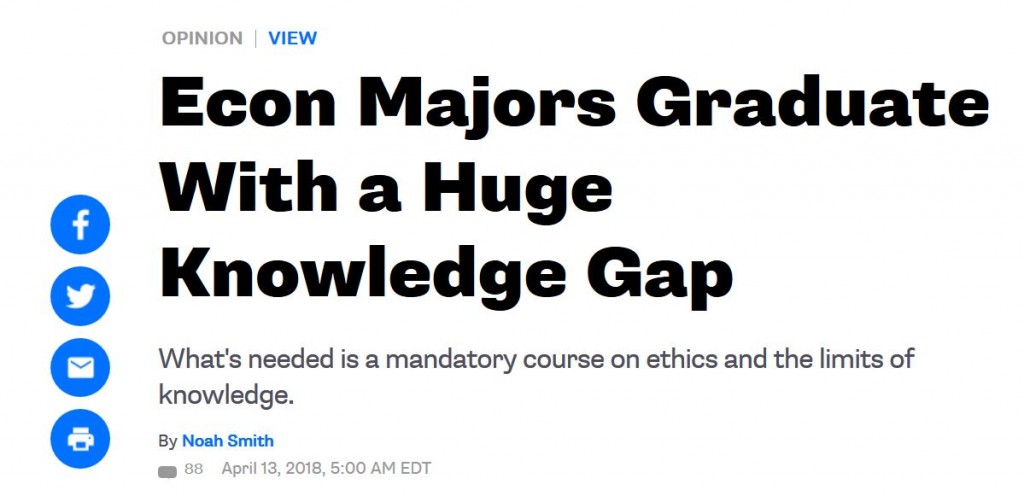Perhaps that is not a very funny title, but it comes from this:
OK, I’ll bite. Not as hard as I used to, but I’ll bite.
What is needed is a mandatory course on ethics and the limits of knowledge
Well, “mandatory?” What is the meaning of mandatory? In any case I like the idea that everyone be encouraged to take it. Heck, that’s what used to happen at colleges, until that sort of thing was deemed unacceptable. I doubt Mr. Smith or many others are out there advocating everyone in every discipline take a methodology class and an ethics class (or some combined version), but it ought to happen. Of course, it also should happen in an unbiased setting. And remember, the limits of knowledge, and ethics, probably should be very respected by folks who plan to use the awesome powers of government to direct us in our affairs.
The models they learn in their college classes inform the way they think about the world, even if they don’t end up using them for quantitative purposes after final exams are over.
So, I teach at one of the top 50 universities in the country, and I can assure you that very few of our students take the “models” they learn in college classes and use that to inform the way they think about the world. Indeed, when college kids are tested on how much they learned in college, economics majors seem to do no better on the test a couple years after graduation than if they never took the major at all. And I can assure you that if I gave an impromptu exit exam to our students before we handed them their diplomas in a few weeks, we’d be left with an excess of paper before the ceremony ended. And is there empirical support for Mr. Smith’s claim? Has he at least done a representative survey of professionals to ask them about how they think about the world? Furthermore, does it matter what kids come into college classes thinking about the world? Because not only does it not appear that they do not learn much in college, they seem to come into college with pretty rigid views of how the world works. So should we now start pushing down this discussion earlier into the students’ careers? And which ones?
They learn plenty of models, but they aren’t often taught to think critically about what they learn. At best, they absorb a few ideas from offhand comments by their professors, or from the tone of their textbooks. As a result, many of them leave class with deep reservations over whether economics theories represent real science, or whether economists approach the world in a moral, socially responsible manner.
Again, assuming we can believe much of this, what evidence is there for it? Does it have anything to do with economics? Also, when students walk into a non-economics class, do students leave those classes with deep reservations over whether the theories they are learning there represent real science, or whether their professors approach the world in a moral, socially responsible manner?
We’ll get to the rest in the future. I find the general topic of epistemology and ethics to be fantastically important, but I do not believe this treatment is doing the issue justice.

I found this excerpt odd: “In addition to the question of how we know when econ models are right, people need to think about the morality of how those models get used. This is where ethical philosophy comes in.”
What a straw horse! Who ever claimed that any model is “right?” Of course they are not right, they are an approximation of reality. If they were reality we’d call them reality. Seems to me hat the relevant question regarding any model is: is it USEFUL?
“What is needed is a mandatory course on ethics and the limits of knowledge”
The limits of knowledge is probably the #1 thing I did learn majoring in economics.